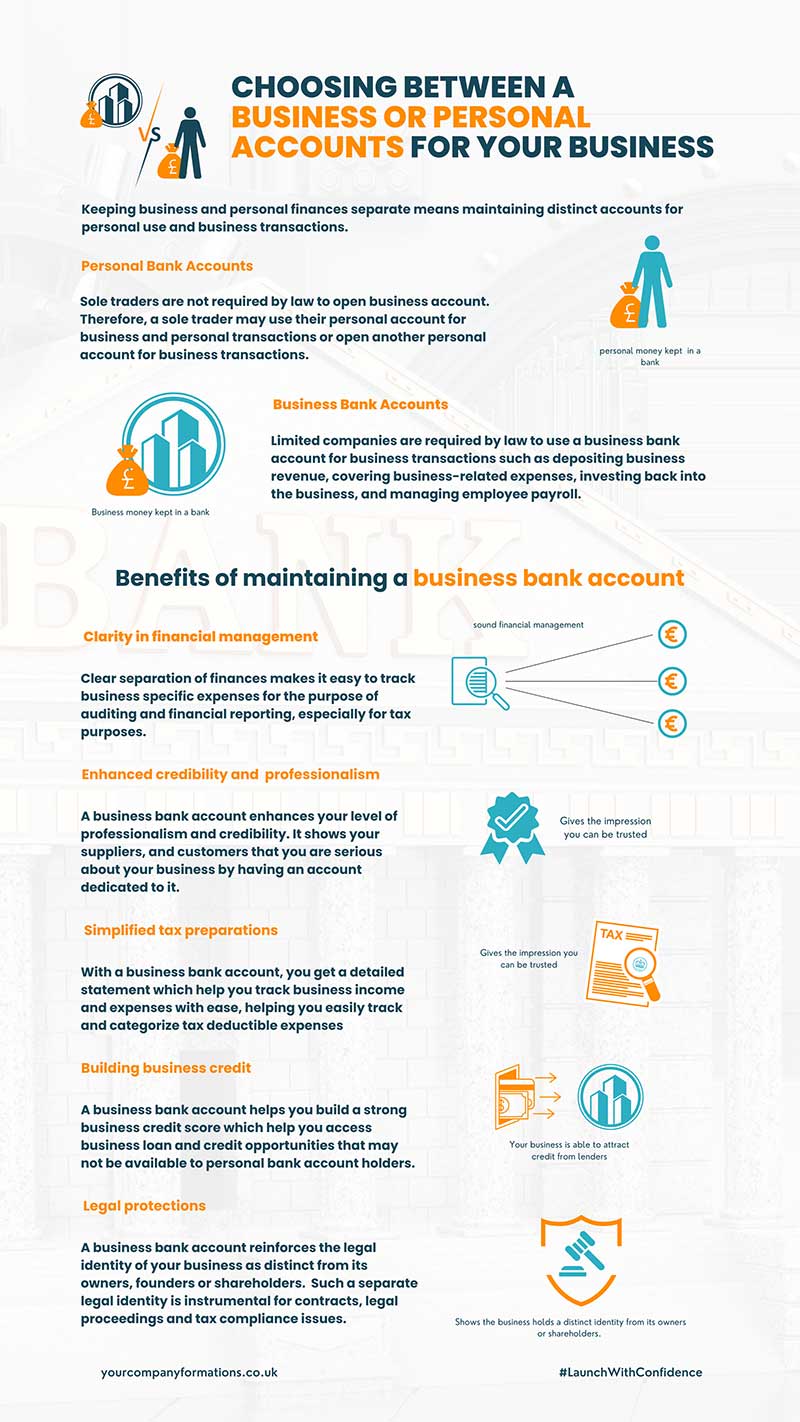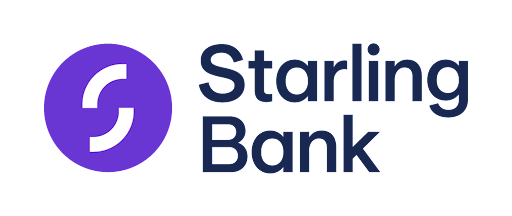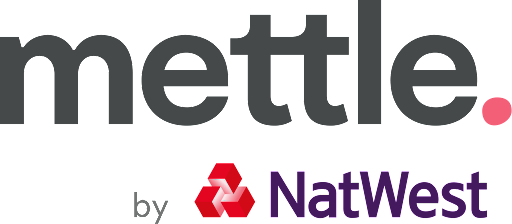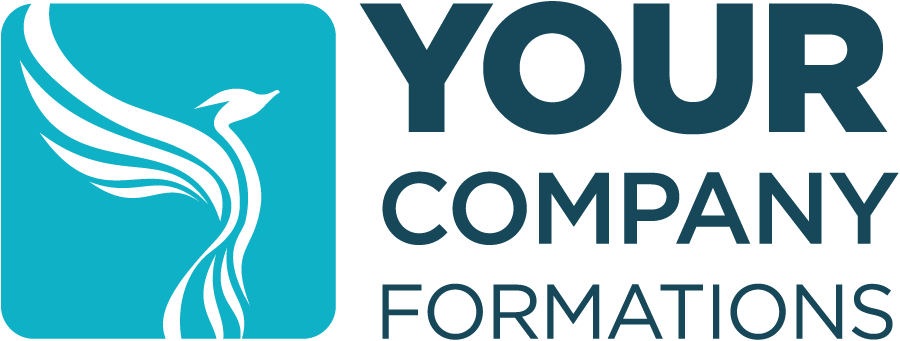🔑 Key Takeaways
- A business bank account is not a legal requirement, but having one is considered best practice.
- When choosing a financial partner, assess their monthly and transaction charges while considering how well their features align with the specific needs of your venture.
- Review their published service quality information to ascertain if it stands out as your business’s optimal bank.
As the business environment gets increasingly complex, directors and company leaders find it essential to leverage the best financial tools. A key component among the arsenal of tools is a corporate account, the primary way most companies manage their financial affairs.
According to a 2019 research by NationWide Media, 43% of micro-businesses with less than ten employees prefer using their personal bank accounts due to the associated costs of maintaining a proper corporate account.
However, although personal accounts might be cheaper, they make it harder to streamline business processes because they lack the features such as automated accounting integration, multi-user access, and batch payment processing necessary to help the business owner simplify their accounting processes.
Warning
Limited companies are distinct legal entities separate from their shareholders and directors. Maintaining a different account for business use, while not explicitly required by law, aligns with this identity. Neglecting this may subject the company and its directors to potential challenges, including complications in establishing a transparent audit trail for tax purposes.
Personal Accounts Vs. Corporate Accounts
Besides streamlined business operations, having a dedicated bank account offers various advantages for multiple business structures, including sole proprietors.

Personal vs business bank accounts
Factors to consider when choosing a business account
Previously, high street banks were the default option. These traditional brick-and-mortar institutions with strategically located branches provided easy access to company funds but only during operating hours.
However, according to the Nationwide Media report, over 58% of micro-businesses (businesses with less than ten employees and a turnover below £1.8 million) reported that banks emphasised profits over efficient service. These concerns, coupled with the rapid advancements in fintech, mainly due to the digitisation gold rush accelerated by the COVID-19 pandemic, have given impetus for significant transformation in the industry.
Digital banking apps make financial services cheaper with 24/7 business support through a smartphone or desktop.
Moreover, traditional banks have blended the benefit of digital and branch services to offer diverse products that cater to a broader spectrum of customer needs. Such drastic changes in consumer preferences forced banks to shift to digital banking products, causing big players like Barclays, NatWest, and Virgin Money to close down multiple branches.
In this context, there are nuanced differences between different account providers. So, if you are just starting a business or looking to shift banks, how do you choose the best bank account? Here are six key things to consider –
-
Monthly fees and transactional charges
Most corporate accounts usually have monthly fees and/or per transaction costs for everyday banking needs. High-street banks, in particular, tend to have higher fees due to the expenses associated with maintaining physical branches. For micro and medium business owners, consider exploring digital-only or hybrid banking options, as they often offer more cost-effective solutions.
Further, for e-commerce businesses that need to accept electronic payments (debit, credit, and gift cards), verify that your account comes with merchant services and review the associated costs.
Before choosing a bank, constantly analyse accounts across multiple providers, specifically checking their full list of transaction and service charges.
-
Financial Services Compensation Scheme
Security is a crucial aspect to consider when selecting a bank. Ensure that your deposits are protected by the FSCS, covering up to £85,000 for eligible businesses. Additionally, verify that the bank is regulated by the Financial Conduct Authority and the Prudential Regulation Authority (FCA and the PRA, respectively), which is evidence of an institution’s commitment to secure and regulated financial services.
It’s worth noting that some banks share licenses within the same group, and businesses with multiple accounts in such institutions would only be eligible for £85,000 in compensation if the group faced insolvency.
Warning
Not all banks are covered by the FSCS. Some financial institutions may be regulated and authorised by the FCA to offer forms of banking services without the full UK banking licence that would make it eligible for FSCS protection. However, all banks regulated and authorised by the PRA offer FSCS protection.
Opening accounts with multiple providers is advisable to enhance the scope of your business deposit protection and mitigate risk exposure. You can choose different banks based on multiple needs:
- A high-street bank with excellent fraud prevention features for high-balance accounts and significant transactions. The enhanced security measures provide an additional layer of protection.
- Use a challenger bank known for agile and user-friendly services for routine business-related purchases and expenses.
- If you need a unified platform to seamlessly accept payments, explore banks that consolidate merchant and current checking account features.
-
Ease of Integration with Accounting Tools and Apps
Selecting the right bank involves considering various features to ensure optimal financial management. One crucial aspect is the ease of integration with accounting tools and apps. A top-notch business account should seamlessly integrate with multiple tools and applications, facilitating the streamlining of financial processes.
Opt for an account that offers smooth integration with essential tools, such as Quickbooks, directly linked to your account. This integration enables the automation of tasks like reconciling transactions, ultimately saving you valuable time. Additionally, compatibility with cloud-based tools like Xero is essential. Xero simplifies tracking income and expenses, managing bill payments and invoices, and providing a comprehensive overview of your cash flow.
By choosing a business bank account that prioritises integration with these tools, you not only enhance efficiency but also empower yourself to make well-informed financial decisions for the success of your business.
-
Local Business Manager
Your local business manager is crucial in ensuring your financial needs are met and perfectly aligned with your business objectives. Taking the time to understand your unique requirements, they offer tailored advice on the most fitting business account from the bank’s array of options.
However, their role extends beyond mere account recommendations. A dedicated local business manager can provide invaluable insights into industry trends, equipping you with the knowledge to navigate the market successfully. Beyond financial solutions, they become strategic partners, assisting you in developing approaches that enhance your bottom line.
With their personalised assistance, you discover the optimal financial solutions and stay ahead of the curve by seamlessly incorporating well-informed strategies into your day-to-day business operations.
-
Current Account Switch Service (CASS)
CASS streamlines the often complicated process of transferring your account from one bank to another. The service offers users a seamless transition by effortlessly redirecting payments, standing orders, and direct debits to a new business account, minimising financial operation disruptions.
For businesses with multiple signatories (with some banks, signatories must be directors registered at Companies House), CASS ensures that all necessary parties are seamlessly included in the account switch, maintaining financial continuity for your business.
Brief Overview of Current Bank Accounts for Businesses
Corporate accounts offer a range of features tailored to the demands and complexities of business operations. While the exact services will vary depending on the bank, the best accounts facilitate organised, professional, and efficient financial management. Many accounts come with a chequebook and debit card, enabling access to funds through various platforms.
Furthermore, other services provide additional benefits such as —
- Online or mobile banking, which offers fast and 24/7 access to funds;
- Merchant services, which enable businesses to accept electronic payments;
- Access to business loans and credit; and
- High daily transaction limit.
Whether you are a freelancer, contractor, a budding enterprise, or a well-established corporation, a dedicated bank account can provide the flexibility you need for effective financial management. The banks mentioned in this article are regulated by the Financial Conduct Authority and authorised by the Prudential Regulation Authority.
Don’t do business alone. Join a Community.
Subscribe to our newsletter and join the ranks of 100,000+ entrepreneurs who receive weekly insights, legal updates, and compliance reminders directly in their inbox.
Our Top 10 Best & Largest Business Current Account Providers (Including App-Only Choices)
-
Revolut – Best Overall UK Business Bank Account

Best for business customers operating in a global market.
Monthly Fee Free bank account (multiple other pricing options available). Access 24/7 via mobile application and web. Cards Plastic and virtual cards for a fee. Eligibility Registered Company Payments - Accept payments online via your website.
- Free international payments with a charge of £3 for every payment beyond the monthly allowance.
- Fee-free local payments with a £0.02 fee applied outside the monthly allowance.
- Payroll management.
Crypto exchange 1.99% applicable fee Support 24/7 UK-based support Integrations Connect company apps like Xero, Slack, Quickbooks and more. -
Starling Bank – Award-Winning Corporate Bank Account

It is ideal for businesses that prefer 100% app-only accounts with no monthly fee.
Eligibility Businesses and solo traders Monthly Fee £0 (No monthly fees) Access Mobile and online banking Cards Mastercard Payment features - Automated business spending categorisation.
- Instant notifications for payment received.
- Apple, Google, Samsung and Garmin Pay.
- In-app and free post-cheque deposits.
- Cash deposits at the Post Office.
Support 24/7 UK customer support. Protection Protected by the FSCS for up to £85,000. Integration Xero, FreeAgent, QuickBooks and other business service applications. -
Barclays Bank PLC Start-Up Corporate Account

Suitable for start-ups and established businesses seeking an affordable blend of branch and digital services.
Eligibility Annual turnover of less than £400k Access Mobile application and web access to account. Monthly Fee Enjoy no monthly account fees for the first 12 months with £50 Cashback when you open your company with Your Company Formations. The account is moved to a standard tariff structure at the end of the year. Payments - Simple electronic payments, including Faster Payments, Direct Debits and standing orders
- Cash-out – ATM/Post Office/self-service device
- Cheques in – Barclays app/self-service device
- Cheques out
- *Fees apply
Debit and Credit Cards Pay for goods and services worldwide with a business debit card. Get cash flow support for your business needs with a business credit card. Support A UK-based team of business managers to help you manage and grow your business. Tools Offers start-up businesses’ current corporate accounts with accessible business and accounting software from FreshBooks worth £260. -
Cardone Money Business Bank Account

Best for small to medium-sized businesses with different levels of access to company leadership.
Eligibility Annual turnover of less than £2 million Access Mobile app and online access Application Fee £55 one-of application fee Monthly Charge 12 months of free banking with £50 cashback – when you form a company with Your Company Formations. Flexible Cards Debit cards for teams with different levels of access depending on roles and responsibilities Support A UK-based team of friendly customer support agents is available to answer your questions, help with the account opening, and provide additional information -
Cashplus Bank Business GO Account

Preferred by small and medium enterprises searching for a digital-only account with no monthly fee.
Eligibility For freelancers, sole traders, SMEs, and growing businesses Monthly Fee £0 Access 24/7 online and app access Card Fees (Contactless MasterCard) £9.95 and £5.95 each for up to 20 additional cards Support Friendly UK-based customer service team Integrations Integrate with accounting apps like QuickBooks, Xero, FreeAgent and more Protection FSCS protection up to £85,000 -
TSB Business Plus Account

An excellent choice for UK-registered businesses looking for
Eligibility Registered UK businesses Monthly Charge 30 months of free* corporate banking when you switch to TSB and £5 per month afterwards. Access Banking App and online banking, you’re always in control, 24/7. Debit card Offered alongside the account. Support 2 months’ free specialist business advice from Enterprise Nation. Tools Grab a free Square reader, enjoy zero fees on up to £5,000 sales, or get 30% off a Square Terminal for easy in-store or mobile card payments. Protection FSCS covers eligible current or savings accounts up to £85,000. -
Mettle Bank Account Built for the Self-Employed

Suitable for micro and small businesses seeking a digital-only account with no monthly fee.
Eligibility Sole traders and limited companies with up to two owners (only one owner can access the account) Monthly Fee Free with £50 deposit when you open an account with Mettle Access Mobile application and web access 24/7. Notifications Instant notifications when funds are deposited into your account. Payment cycle management Create and send customised invoices on the go. See what’s been paid and what you’re owed within one click. Support Quick, fast and efficient customer service. Tools Account includes free access to FreeAgent, award-winning accounting software worth over £150 per year.* Safety Eligible funds are protected up to £85,000 by the FSCS. -
Counting Up Business Current Account

Tailored for SMEs seeking an affordable corporate account.
Eligibility Solo traders and limited liability companies Monthly Cost £3/month for businesses which get £0 – £750 in monthly deposits. Access 24/7 mobile application access Cards Contactless Mastercard (Fees may apply) Payment Instant notifications for payments made to your account. Support First-class UK-based support team Tools Recieve automated live business insights such as estimated corporation tax based on your transactions. -
Anna Business Current Account

Perfect for SMEs interested in an account with transparent costs.
Eligibility UK registered businesses. Monthly Fee £0 (pay as you go) Access Mobile application and web access are available 24/7. Cards Mastercard® Business debit card and get 1% cashback when you use your card for eligible business expenses. Payment Get instant notifications for account debit and credit activity. Support Award-winning 24-hour customer support. Tools Connect your ANNA bank account with personal and corporate accounts held in other banks. -
Virgin Money Business Account

Ideal choice for small to medium-sized businesses
Eligibility For businesses with an annual turnover of less than £6.5 million. Monthly Fee 25 months of free day-to-day banking. Access Mobile application and web access available. Cards Mastercard with discounts Payment - Customers will earn 0.35% Cashback (capped at £500 per calendar year per Debit Card).
- Automated business spending categorisation
- Compatible with Apple and Google Pay
- Manage scheduled payments
- Make free UK bank transfers
- In-app cheque scanning
Integrations 3 months of QuickBooks or Xero for fee-free* when you open an account with Virgin. Comes with Sage and Quickbooks integration. Protection Eligible deposits are covered up to £85,000 per business.
About FCA Service Quality Information Requirements
In compliance with regulatory standards, each of the 15 largest business current accounts providers conducts and updates every six months (August and February) an independent survey polling approximately 1200 customers. The survey assesses whether these customers would recommend their respective providers to other small and medium-sized enterprises (SMEs) and is published as service quality information.
Customers should look out for this publication when researching banks, as it equips SMEs with essential data to make informed comparisons and choose the most suitable banking partner for their needs.
Key elements covered in the report include:
- Likelihood of recommending the provider to other SMEs
- Online and mobile banking services
- Branch services
- SME overdraft and loan services
- Relationship/account management services
While the FCA oversees the publication of the survey report, it does not conduct the surveys directly. Independent research companies are tasked with gathering and analysing the data, which the FCA then utilises to generate reports on the performance of each participating provider. These reports are accessible to the public through the FCA’s official website.
FAQs
What do I need to open a business bank account?
You need the following documents to apply for a business account –
- Proof of identity and UK address. Some accounts require that signatories be UK residents and work with businesses based in the uk.</p
- Business details, including business name and certificate of registration (only business name is required for solo traders), company registration number (not required if a solo trader), company official’s registration forms (not required if a sole trader), main business activities, number of employees (not required if a solo trader, business investment, a description of the main business activity, expected turnover and tax status.</p
- Unless you are a single party, you must complete a mandate and acknowledge account terms.</p
Some banks may also require a letter from an accountant or solicitor confirming your trading address. In the absence of such a letter, depending on your bank of choice, you may be required to file a bank or credit card statement (not including store card statements) in the name of the business sent to your trading address within the past three months.
Review this business banking checklist from UK Finance, the UK’s leading trade association for financial services, to help you prepare to open a business checking account.
-
What is a Business or Corporate Bank Account?
A corporate account is handy for managing finances and conducting business transactions for solo traders, partnerships, limited companies, societies, charities, and clubs. Legally, it’s a requirement if you’re a limited company registered with Companies House. However, if you’re operating under a personal liability business structure, there’s no legal obligation to have one. Nevertheless, many entrepreneurs opt for a separate bank account and enjoy the efficiency of separating personal and business finances.
Read Also: What Is a Limited Company?
-
Do I need a business account as a sole trader?
As a sole trader, the law doesn’t demand that you have a bank account. But here’s the deal: having one and keeping your business finances separate from your personal funds can be wise for several reasons.
- Tracking business expenses and income requires less effort in one dedicated place. Moreover, during tax season, you’ll undoubtedly appreciate the benefits of well-organized financial records.
- It adds a touch of professionalism to your commercial engagements. As clients pay to your corporate account, it sends a clear message that you treat your business finances with transparency and utmost care, which can be very reassuring to clients.
- Separating your finances creates a distinct boundary between your business and personal funds, protecting your wealth, property, and investments from potential liabilities and creditors associated with your venture.
So, while it’s not legally required, getting a bank account as a sole trader is a practical and wise choice.
-
Can I use a personal account for business?
Depending on the nature of your commercial activities and the payments you receive, you can use a personal account if you have a sole proprietorship. However, having a specialised account for your business activities is advisable. Mixing finances can lead to confusion, especially during tax season, making it difficult to accurately track your business expenses and income.
-
What are the most common reasons business account applications are rejected?
Business account applications can be rejected for various reasons. Here are some common factors that may lead to rejection:
- Poor credit history — a history of late payments, defaults, or other credit issues can significantly impact the approval of a business account.
- Insufficient documentation – incomplete or inaccurate submission of required documents can lead to application rejection. Ensure you provide all necessary paperwork to support your application. Also, please review the checklist from uk finance to help you effectively prepare for account application.
- Unstable business finances — banks may reject applications if your business is experiencing financial instability, such as consistent losses, high debt levels, or irregular cash flow.
- High-risk industry – businesses operating in industries perceived as high-risk, such as gambling or cryptocurrency, may face challenges in obtaining a business account.
- Legal or regulatory issues — legal or regulatory problems, including unresolved disputes or issues with compliance, can lead to rejection.
- Negative banking history — if your business has a history of account closures, fraud, or suspicious activities, it can raise red flags for new account applications.
- Business structure — some banks may require businesses to have a specific legal structure (e.g., registered as a limited liability company) for account approval.
- International transactions — Some banks may be cautious if your business involves significant international transactions, leading to potential rejection.
- Personal credit issues of partners and directors: in cases where the business owner’s credit history is closely linked to the business, issues with personal credit can impact the application.
It’s crucial to thoroughly review the bank’s requirements, ensure accurate documentation, and address potential red flags before submitting a business account application. If your application is rejected, you can inquire about the specific reasons and work on resolving those issues before reapplying.






